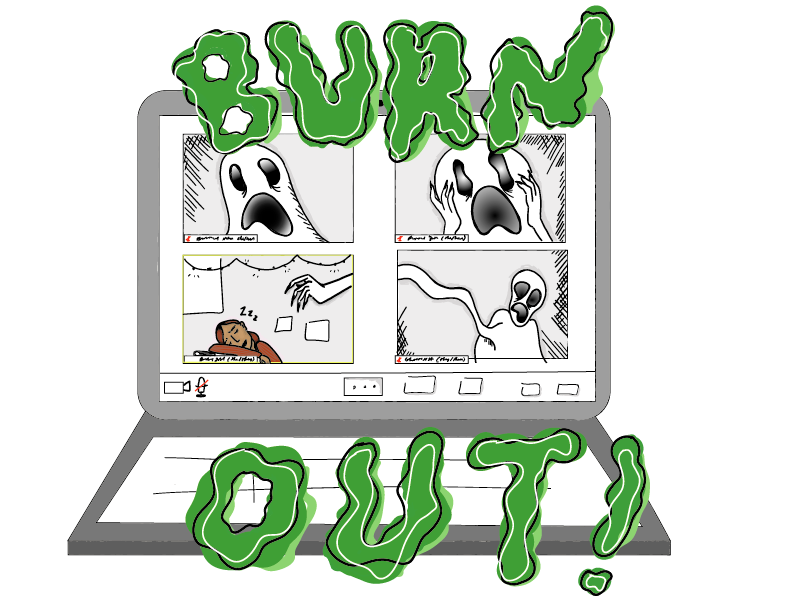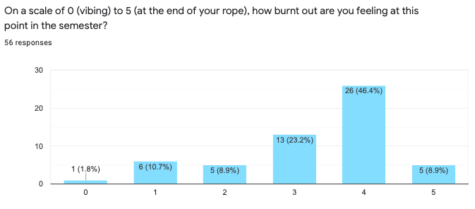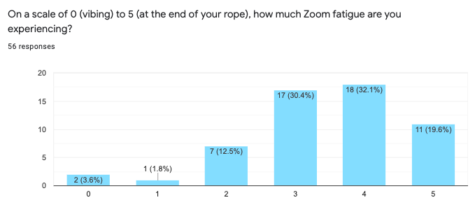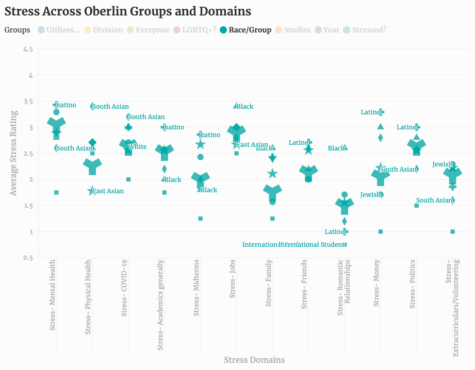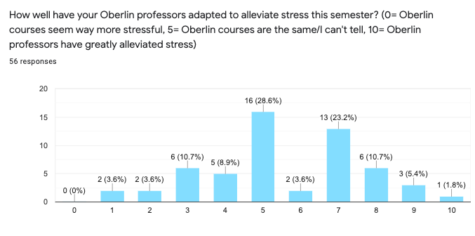Feeling the Burn: Obies on COVID-19 Burnout
April 9, 2021
Due to scheduling challenges caused by the pandemic, Oberlin’s academic calendar has been expanded into three semesters. Importantly, this semester lacks a traditional spring break, replaced by just two days off from classes. Now, with six weeks until the end of the semester, students are starting to feel the impact. Some argue that the lack of breaks compounds the stress and isolation inherent to attending school in a pandemic, with many complaining of burnout and academic anxiety.
Over the last few weeks, 53 students participated in a Review survey about burnout. Students of all class years shared their experiences with professors, life stressors, and coping mechanisms. Peoples experiences varied across different demographics; fourth-years, transgender and nonbinary students, and people with accomadations all experience high levels of burnout compared to their peers. Latinx students were the most stressed about politics and money, while Black students were the most stressed about family. Below you can see more data analysis in the graphs below along with individuals’ stories.
The Stories
Students were asked what their biggest stressor is at the moment:
“I do feel my [mental] health slipping as a result of being overwhelmed with work this semester. Which then makes it harder to do work, which … [becomes a cycle]. Also I’m dealing with some non-COVID physical health issues that have made it difficult to participate in activities that usually help with mental health,” said a College third-year studying Environmental Science, Hispanic Studies, and Sociology.
- School/classes and Zoom fatigue
- Motivation for work
- Internships/jobs
- COVID-related issues — the virus itself, isolation, activity restrictions, uncertainty
- Summer semester/summer plans
- Life after Oberlin
- Friendships/relationships
- Mental health
Can you talk about an instance when you felt especially burnt out this semester?
“One of my classes is 35 people on Zoom and we spend a lot of it in breakout rooms. Sometimes you’ll go the whole class without the professor visiting your breakout room, and when some of the other people have their cameras off [or] haven’t done the readings it gets really depressing. It just feels like there’s absolutely no point to being there, and definitely brings up the ‘Why am I paying for college again?’ question,” said a College third-year studying English and Creative Writing.
“There was one point when I looked at my [Google Calendar] and just cried. As a sophomore not taking classes, I have so many moving parts. I’m struggling to juggle [my] micro-internship with keeping up with on-campus organizations and working a paying job along with the social stress of maintaining long-distance relationships. Because it’s … spring, I don’t feel like I can treat this time like a vacation. While being overworked, I also have the overwhelming sense I am never doing enough to fill the time,” said a College second-year studying Neuroscience and Hispanic Studies.
- Midterms
- Full days on Zoom
- Not having a long enough spring break
- Balancing work/life/long-distance friendships
Many students were particularly concerned about midterms, with some saying that they had as many as three midterms in one week, causing a lot of stress that was not alleviated over the two-day break. One student expressed experiencing even more burn out during the break because once they could finally rest, the exhaustion that had built up throughout the semester came to a head and the break was not long enough to fully recover. A few students also commented that they had work due during or immediately after the break, causing more stress.
Another common cause of burnout was Zoom fatigue. Those who are not enrolled in classes this semester, primarily College second-years who are unenrolled due to the three-semester plan, are also struggling with burnout due to jobs, internships, and feeling isolated from friends. Some also expressed feeling like they aren’t doing enough to fill the time during their semester off as it does not occur during traditional summer break months. Students have been struggling to stay motivated — one student felt dread at the idea of working on a paper that they were late to turn in, while another struggled with technical and communication difficulties, causing them to turn in an online project late. Online classes have challenges as well, especially in breakout rooms.
What is the main way you cope with stress?
- Exercise/walking/going outside
- Going for drives
- Hanging out with friends
- Talking to friends, family, advisors, therapists
- Sleeping
- Watching TV/movies (e.g., anime/cartoons, sports)
- Gaming
- Reading/writing/journaling
- Alcohol/weed
- Completing assignments/getting work done — feeling productive
- Playing/listening to music
- Cooking/baking
- Crochet/knitting/painting
- Going to Ginko [Gallery] to pet kittens
Can you name some instances or policies that a professor has used that alleviated stress since the pandemic began last March?
“Letting us turn cameras off and not getting mad about it! Probably the easiest way to make my life a lot better. [Also] adding extra late days for assignments, assignment redos, extra credit, and extra hours outside of class to help with assignments. Generally having a kind and understanding demeanor can go a long way because if a professor offers office hours, but [if] their personality intimidates me I probably won’t take advantage of them,” said a College first-year.
- Extensions for assignments/flexible deadlines
- Canceling class for the week of spring break
- Open-note tests
- More leniency for late work, missing class, having cameras off
Most students reported professors being much more flexible about extensions and deadlines, either by pushing back due dates for assignments, accepting late work, or implementing a rolling deadline policy. One student said that their professor has suggested deadlines, making assignments less stressful but still allowing them to regulate their workload. Some professors have also given students a lighter workload, made tests open-note, turned exams with more weight into smaller tests, and pushed back test dates. A few students mentioned that more office hours have been added and more extra credit is being offered.
Last spring, one professor presented his class with a less intensive pass/no pass course pathway, which greatly alleviated stress for one student. This semester, one professor is asking students to give a 10-minute presentation in lieu of a 10-page final paper. Another professor allows their students to revise their papers as many times as needed, and yet another has their students write many smaller papers as opposed to only a few larger ones. Only the best seven papers count toward their grades, so they have the option to skip some if they are particularly stressed or having a difficult week.
Last spring, a few professors implemented a “universal pass” for their classes, allowing students to earn a B as long as they turned in all of their work. Many professors canceled class for the week of spring break and one professor occasionally gives their students a free day. Some professors also end class early and are more lenient about attendance and not having cameras on in class.
Can you name some instances or policies that professors have introduced or upheld that have made you more stressed since the pandemic began last March?
“Remote closed-book exams are such a moral dilemma for me. People will use their notes and there’s no way for [professors] to know, so they screw up the curve and you get hurt for not using notes,” said a College second-year studying Environmental Studies and Psychology. “So it’s in your best interest to use notes but that’s morally wrong and it’s quite a dilemma for me every time.”
- Same amount of/more work
- Strict tests (timed, closed-note, etc.) and due dates
- Long Zoom days without breaks
- Inflexible office hours
- Group work
Many professors have not adjusted workloads and some students have found that they are actually getting more work, longer readings, and stricter deadlines. Some professors also decided to give students a lot of work over spring break and election week, adding extra stress to a challenging time. Another issue for students is inflexible office hours that are by appointment only. Some classes have asynchronous times in addition to synchronous ones, while others are synchronous that could easily be asynchronous. Students are finding it difficult to get through long Zoom meetings without breaks, or long Zoom days in which it is challenging to stay engaged. This is worsened by professors who are strict about absences and keeping cameras on. Another teacher allowed students to have three absences, yet utilizing these absences negatively impacted the students’ participation grades. Many students also said that group projects proved to be especially difficult due to coordination between time zones.
What is something you think professors, departments and the administration can do to alleviate stress?
“Give students days off! Reduce workloads! I know professors want to maintain academic rigor which is admirable, but there has to be recognition that at a certain point an excess of rigor detracts from actual learning and the overall health of students,” said a College fourth-year studying Hispanic Studies.
- Acknowledge/discuss ongoing stressors (e.g., pandemic, vaccines, social justice, etc.)
- More days off
- Smaller workload (especially over breaks/weekends)
Most students want more breaks or days off, especially during the upcoming summer semester. They also want to be able to actually utilize their breaks and weekends, so they wish professors would assign less work during those times. During midterms and finals, it would be helpful for professors to spread out deadlines so that students don’t have to do all of their work at once. In addition, it would be beneficial for professors to engage in discussions with students about current stressors (e.g., the pandemic, social injustices, and current political state).
Do you have accommodations with Disability Resources at the Center for Student Success for academic or emotional support? How has your experience been during the pandemic?
“Yes, I do — I have found in some instances that professors are less willing to accommodate my needs because everybody is struggling now. I was denied due date leniency because so many people were asking for extensions and because I had used my accommodations before in the semester. This is literally illegal,” said a College third-year studying Gender, Sexuality, and Feminist Studies, Law and Society, and Sociology.
One student has an attendance leniency accommodation and found that most of their professors were willing to work with them, but some were still inflexible. Another student who uses note-taking services, extended exam time, and an alternative testing environment did not notice a better or worse experience during the pandemic. A student who uses an emotional support animal found that their ESA helped them to feel less lonely during the pandemic.
Anything else to say about burnout, your experience or generally?
“It can be really hard to just sit and listen in a class in person, but it’s even harder to do it on Zoom. I found myself coloring during one of my Zoom discussions and it actually helped a lot. It kept my hands busy but still allowed me to listen and participate,”said a College first-year studying Politics and Dance.
- Exhaustion from stress, tech, workload, etc.
- Three-semester system will cause more burnout
- Difficult to focus on Zoom (especially for remote students)
Some students are exhausted due to unrelenting stress and work. One student said that they always have so much on their mind and that constantly using technology is very draining. Another is concerned about burnout getting worse for sophomores and juniors who do not get a summer break due to the three-semester plan. Many students feel that the administration needs to do more to help students; one student commented on the hypocrisy within the administration with regard to its rhetoric around burnout and said that they need to focus on helping students with their mental health and stop giving them “life-threatening amounts of stress.” A few students also mentioned the difficulties of being remote and are finding it difficult to focus in class over Zoom. A student discussed the effect that weather has on their depression and that the pandemic has heightened their sensitivity to those changes.
The Numbers
Students were asked to rate their burnout and Zoom fatigue on a scale of 0–5, with 0 roughly defined as “vibing” and 5 as “at the end of my rope.” The average response was 3.44 out of 5, indicating high Zoom fatigue.
Students were also asked to rate their stress related to the following 12 issues: mental health, physical health, the COVID-19 pandemic, general academic performance, midterms, employment and internships, finances, politics, extracurricular activities/volunteering, and relationships — including familial, friendly, and romantic ones. For each domain, students had the option to choose not applicable, not concerned/doing well, slightly stressed, medium stress, very stressed, or personal crisis.
These scores were calculated on a five-point scale with personal crisis being “5,” unconcerned “1,” and N/A excluded. In doing so, we can compare means of stress across different domains by group. For example, below it can be seen that across race/group, Latino students (7) lead in stress regarding mental health, general academics, midterms, friends, money, and politics. Black students (5) lead in stress regarding jobs, family, and romantic relationships. South Asian students (5) lead in physical health and COVID-19 pandemic stress. Jewish students lead in extracurricular stress. Across all domains except physical health, international students (4) reported the lowest stress.
Students’ level of burnout varied depending on their identities, needs, and academic positions. People with academic/emotional accommodations (5), sociology students (7), and trans/nonbinary/genderqueer students (12) reported the most burnout. International students (4), and Conservatory students (2) reported the least burnout. Zoom fatigue can be observed via the color code, and groups can be isolated for comparisons.
Explore more below!
The answers “very stressed” and “personal crisis” were grouped together under “critical stress,” and “concerned/doing well” and “slightly stressed” were considered “less stressed.” This was done for the following stress categories: mental health, physical health, family, academics, and finances.
Students were asked on a scale of 0–10 “ How well have your Oberlin professors adapted to alleviate stress this semester?” with “0” defined as “Oberlin courses seem way more stressful,” 5 defined as “Oberlin courses are the same/I can’t tell” and 10 “defined as Oberlin professors have greatly alleviated stress.”
Areas of study have been defined as follows based on the self-reporting of respondents:
- Psychology (14)
- Sociology (7)
- Other Social Sciences (8, politics, economics, education studies, peace and conflict studies )
- STEM (19, Biology, pre-med, Physics, Chemistry, Computer Science, statistics, environmental studies, neuroscience )
- Music (6, conservatory musical performance, musical studies)
- Cultural Studies (15, Hispanic Studies, Africana Studies, Greek, GSFS, Comparative American Studies, Law and Society )
- Humanities (9, anthropology, English, history, philosophy)
- Creative Arts (9, creative writing, studio art, dance, cinema studies)
Students were asked to talk about majors, minors, and concentrations, which were not recorded differently. Psychology and sociology were isolated due to the numerous responses.
In the graph below, it is apparent that international students (4), humanities students (9), and those who are less stressed about academics (10) have the most positive opinion of professors’ ability to accommodate amid the pandemic. On the other hand, dual-degree students (2) , Jewish students (7), and those critically stressed about family (7) have the most negative opinion on the matter. You can explore all groups below, color-coded by average group burnout.
